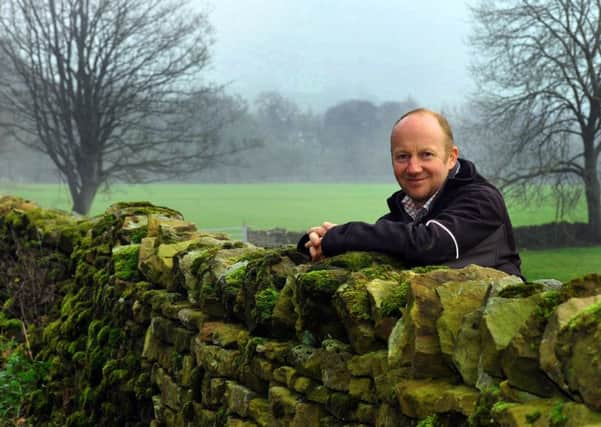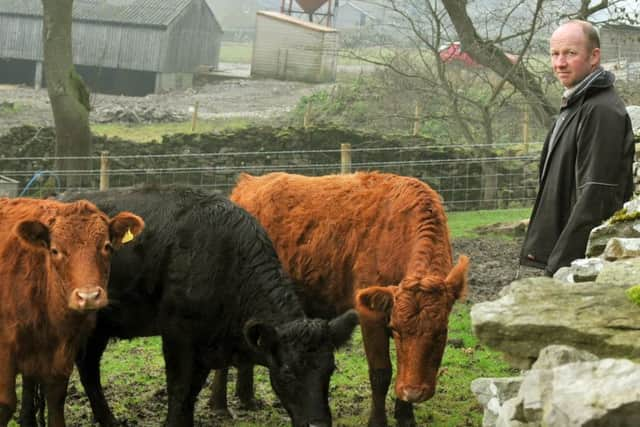Dexter cattle give ex-drystone waller new lease of life in Yorkshire Dales
This article contains affiliate links. We may earn a small commission on items purchased through this article, but that does not affect our editorial judgement.


“My surgeon said if I continued walling I was going to end up paralysed,” says Stuart, whose current 70-head of Dexter cattle are providing him with a new lease of life having recently completed a deal that offers the best security in the workplace he’s ever had.
“I took up walling in my twenties and basically my back was knackered from years of wear and tear through excessive lifting. I thoroughly enjoyed my job but it couldn’t go on as I was in excruciating pain and on quite a lot of medication. After surgery in September two years ago I sat down with my bank and worked out what to do.”
Advertisement
Hide AdAdvertisement
Hide AdFortunately, Stuart had an asset in the 120-acre family farm at Carperby he’d purchased after his father passed away in 2008. Bolton Estate whom he had walled for offered the opportunity to tenant the 75 acres of land that makes up East End Farm, which he duly took on in March last year.


“I was born at Hollins Farm four miles away and it has been in the family for at least five generations, but I moved to Thoralby and then Aysgarth before my wife Ginny and I took a property in the village of Castle Bolton in 2007.”
Having kept a flock of 280 breeding ewes, a small herd of Highland cattle and a herd of continental X to sell as stores Stuart started buying Dexters.
Advertisement
Hide AdAdvertisement
Hide Ad“I’d become so disappointed with inconsistency in flavour and taste of beef, particularly if bought from a supermarket, and the Dexters really do pack a flavour from our herb rich grasses. Consistency is what any butcher, chef or restaurateur is looking for and we are looking to provide just that through fantastic marbling brought about by keeping them as naturally reared as possible.
“Farming is in a dodgy predicament at the moment and none of us know how it is to change through the Brexit negotiations and whatever happens over the BPS so security of income is good news.
“Livestock markets tend to focus on sales of continental crossbreeds such as Limousin and Belgian Blue and native heritage breeds such as the Dexter fare better when sold to individual buyers who are looking for the specific breeds. Many struggle to find the right market even though the beef produced is of much greater quality and succulence brought on by slow growth and finishing at beyond 30 months.”
Stuart will supply 50 cattle to the Ripon-based online butchery retailer Farmison & Co next year at an agreed rate.
Advertisement
Hide AdAdvertisement
Hide AdIt’s an arrangement that pleases both parties as while Dexter may not be on the lips of every beef consumer right now it has certainly carved itself a reputation in a quality niche market and the company is looking to shore up its supply chain. Stuart is delighted with the new deal.
“This gives me security to invest further into the breed and build my herd. I enjoy keeping cows and working with them. While up until now I have been buying in cattle from other Dexter farms to meet demand I will now be keeping my better quality heifers to put to a stock bull I intend to buy shortly. I’m looking for a stocky, non-short legged bull that will serve the herd and help produce a well fleshed finisher of around 30-36 months.
“Consistency is what I need and trying to get that doesn’t come easily as there are several Dexter types but as time goes on and we build up our own herd without the need to buy in we will be able to draw the right numbers at the right time.
“As Nick Mellin of Farmison & Co says it is the consistency coming through their doors of being able to cut steaks to the same thickness and weight that is important for their business.
Advertisement
Hide AdAdvertisement
Hide Ad“That’s why I want the majority of our stock to be homebred in future because we then have greater quality control.
“I had bought a number of largely Aberdeen Angus X store beasts to maintain income. I sold the stronger cattle in September due to the dry summer leaving me very short of feed. We took our first cut at East End Farm that same month and had nothing at Hollins. We’ve bought in big bales of dry haylage and hay to keep them going through winter and as they are such good grazing animals we try to keep them out as much as we can. The haylage and hay also helps with the marbling.”
Stuart also has plans to possibly take on another traditional native breed that is currently enjoying a resurgence.
“I really like the thought of having a herd of Herefords as well as continuing to grow the Dexter herd. They are also best when slow grown and produce another well marbled product.
Advertisement
Hide AdAdvertisement
Hide Ad“Nick Mellin and Andy Cavanna of Farmison & Co sold out of their Dexter beef cuts for this Christmas and tell me their feedback has been excellent over the Dexters we have supplied so far, notably the depth of flavour.”
Sheep have always been a part of the Raw farming mix and Stuart has also rung the changes here. His flock now numbers 350 ewes and gimmers and he has moved to two relatively new composite breeds from expanding sheep breeding company Innovis based in Aberystwyth.
“We have Aberdale and Aberfield that can be kept on poor marginal land and achieve high levels of prolificacy as well as tupping, lambing and being ready for market quickly. We’ve lambed the Aberdales for three seasons and they’ve been good for us but we’ve been struggling to source them as at present they are predominantly Welsh based.
“We are also very keen on the environment. We’ve planted thousands of metres of hedgerows for birds and wildlife as well as coppices to control water pollution.”